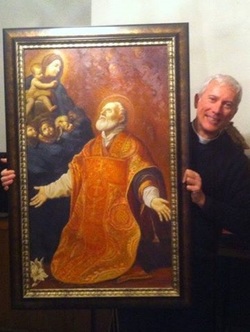
Oratorians around the world are celebrating the Octave of St. Philip’s Day, which was Tuesday of this week. On May 26, 1595, about 2am, Good St. Philip died in the Oratory having almost reached 80 years on this earth.
Caesare Baronius, one of his earliest disciples, and one of the first Oratorian cardinals, wept at St. Philip’s deathbed: “Father, are you going to leave us?”
God gave us St. Philip as that rare priest who is naturally, and unabashedly, a father. He was a father to hundreds in Renaissance Rome long before he became a priest (Philip was a late vocation); through his intense interior life—his nights spent in solitude and days serving the poor—Jesus drew him to God the Father, whose divine paternity graced Philip’s every encounter with others. In our own time, when fatherhood is in crisis, the Church recommends St. Philip to us, to reassure us that fatherhood is still possible, and that it is not all that complicated. God gives the grace of fatherhood to those who trust His own fatherhood, who persist in allowing His will to overcome our own. A weak father insists on his own will, his own powers, but a strong father relies, with a good sense of humor and self-deprecation, on the fatherhood of God.
Apostle of Renaissance Rome
The Roman people, and the Roman Church, call St. Paul of Tarsus the First Apostle of their city. But they also call St. Philip of Florence the Second Apostle of Rome. And the Rome St. Philip made his home in 1535 was not unlike Paul’s Rome in that it was undergoing a “renaissance,” shaking with the rebirth of art, ideas, and wealth. St. Philip did not despise anything good in the Renaissance, but neither was he overawed by these new dynamisms of the human spirit. His long nights in the catacombs prepared him to keep human achievements in perspective, bringing a winning humility to the regnant hubris of Renaissance Rome. Though very much alive to the world (he remained a secular priest and commanded his followers to do the same), he kept his heart fixed on heaven. “To obtain perfectly the gift of humility,” St. Philip said, “four things are required: to despise the world, to despise no person, to despise one’s self, to despise being despised.” It is in this insight, I think, that St. Philip reveals his effectiveness as the Second Apostle of Rome.
To despise the world
St. Philip “despised” the world. He refused to let it dazzle him, holding always man’s final end before his mind. “What will you do in life?” he asked a young nobleman. “I plan to study law and become an attorney.” St. Philip pressed him: “And then?” he asked. “And then,” the young man replied, “I will be a successful lawyer.” “And then?” Philip again asked his young friend. “And then people will speak well of me and I’ll have a good reputation. “And then?” came the question once again. “And then I shall lead an easy life and be happy.” St. Philip asked a final time: “And then?” Across the centuries Good St. Philip asks us: where do you want to be at the end of it all? For what are you making such a tremendous exercise of your beautiful human spirit if not for God and heaven?
To despise no man
St. Philip despised no person. Like Mother Teresa of our own time, he saw Christ before him in every man, each made in the image of God. Those who take faith seriously in a secular society are tempted to hold aloof from irreligious people; what have we to do with them, and how can we even hold a meaningful conversation? St. Philip took a keen interest in every man and woman, holding no one in contempt. This was a grace, but a grace to which he responded, sometimes at great personal cost.
To despise myself
St. Philip despised himself. He did not despise the image of God in himself, nor discount the great good that he was to all of humanity. But he knew every man needs to offset the egocentrism inherent in all who inhabit their own skins. So he did his best not to take himself too seriously, often using an odd humor to deprecate his own and others’ egos. People shook their heads, some considering him completely loony, at the crazy stunts he pulled off among Rome’s gentile classes.
To despise sadness
And finally, St. Philip despised being despised. I’m not exactly sure what that means, but I think he is taking a stick to overly pious and fraudulent asceticism. Plenty of us think that our sufferings, of themselves, our being despised by the world in itself, is a sure sign of our true holiness. Not so, says St. Philip. In the end, it is joy, not moroseness, which manifests true holiness. This last “requirement for true humility,” to despise being despised, puts humility back into God’s hands. We cannot manufacture our own humility, or our one sanctity. We can only commend ourselves, with loving trust and true joy, into God’s hands. It is this carefree joy that marks St. Philip’s life, and, let us hope, his sons in the Oratory he founded.


 RSS Feed
RSS Feed